

Divination. This man in Rhumsiki, Cameroon attempts to tell the future by interpreting the changes in position of various objects as caused by a freshwater crab through the practice of nggàm[1] Divination (from Latin divinare "to foresee, to be inspired by a god",[2] related to divinus, divine) is the attempt to gain insight into a question or situation by way of an occultic, standardized process or ritual.[3] Used in various forms throughout history, diviners ascertain their interpretations of how a querent should proceed by reading signs, events, or omens, or through alleged contact with a supernatural agency.

Divination can be seen as a systematic method with which to organize what appear to be disjointed, random facets of existence such that they provide insight into a problem at hand. Divination is dismissed by the scientific community and skeptics as being superstition. Categories[edit] Psychologist Julian Jaynes categorized divination into the following four types:[citation needed] D. Aeromancy. Approaching thunderstorm Aeromancy (from Greek aero, "air", and manteia, "divination") is divination conducted by interpreting atmospheric conditions.
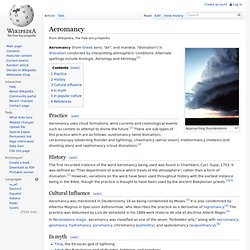
Alternate spellings include Arologie, Aeriology and Aërology.[1] Practice[edit] Aeromancy uses cloud formations, wind currents and cosmological events such as comets to attempt to divine the future.[2] There are sub-types of this practice which are as follows: austromancy (wind divination), ceraunoscopy (observing thunder and lightning), chaomancy (aerial vision), meteormancy (meteors and shooting stars) and nephomancy (cloud divination).[2] Apantomancy. Apantomancy is a form of divination using articles at hand or things that present themselves by chance.[1] The diviner works him/herself into a state of trance until an object or event is perceived and a divination worked out.

Capnomancy. Capnomancy (otherwise known as Libanomancy)[1] signifies a method of divination using smoke.
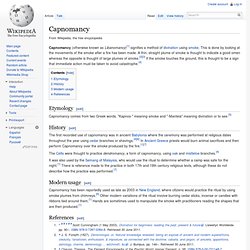
This is done by looking at the movements of the smoke after a fire has been made. A thin, straight plume of smoke is thought to indicate a good omen whereas the opposite is thought of large plumes of smoke.[2][3] If the smoke touches the ground, this is thought to be a sign that immediate action must be taken to avoid catastrophe.[4] Etymology[edit] Capnomancy comes from two Greek words. "Kapnos-" meaning smoke and "-Manteia" meaning divination or to see.[5] History[edit] The first recorded use of capnomancy was in ancient Babylonia where the ceremony was performed at religious dates throughout the year using cedar branches or shavings.[4][6] In Ancient Greece priests would burn animal sacrifices and then perform Capnomancy over the smoke produced by the fire.[1][7]
Cleromancy. Cleromancy is a form of divination using sortition, casting of lots, or casting bones or stones, in which an outcome is determined by means that normally would be considered random, such as the rolling of dice, but are sometimes believed to reveal the will of God, or other supernatural entities.
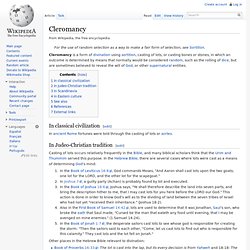
In classical civilization[edit] In Judeo-Christian tradition[edit] Casting of lots occurs relatively frequently in the Bible, and many biblical scholars think that the Urim and Thummim served this purpose. In the Hebrew Bible, there are several cases where lots were cast as a means of determining God's mind: Haruspex. Oneiromancy. Oneiromancy (from the Greek Oneiros) is a form of divination based upon dreams; it is a system of dream interpretation that uses dreams to predict the future.
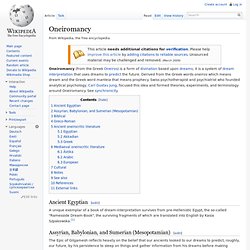
Derived from the Greek words oneiros which means dream and the Greek word manteia that means prophecy. Swiss psychotherapist and psychiatrist who founded analytical psychology, Carl Gustav Jung, focused this idea and formed theories, experiments, and terminology around Oneiromancy. See synchronicity. Ancient Egyptian[edit] A unique exemplar of a book of dream-interpretation survives from pre-Hellenistic Egypt, the so-called "Ramesside Dream-Book", the surviving fragments of which are translated into English by Kasia Szpakowska.[1] Assyrian, Babylonian, and Sumerian (Mesopotamian)[edit] The Epic of Gilgamesh reflects heavily on the belief that our ancients looked to our dreams to predict, roughly, our future, by his persistence to sleep on things and gather information from his dreams before making decisions.
Ornithomancy. Ornithomancy (modern term from Greek ornis "bird" and manteia "divination"; in Ancient Greek: οἰωνίζομαι "take omens from the flight and cries of birds") is an Ancient Greek practice of reading omens from the actions of birds, equivalent to the Augury employed by the ancient Romans.
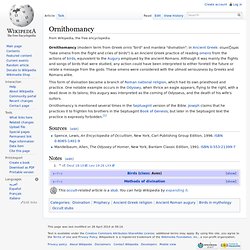
Although it was mainly the flights and songs of birds that were studied, any action could have been interpreted to either foretell the future or relate a message from the gods. These omens were considered with the utmost seriousness by Greeks and Romans alike. This form of divination became a branch of Roman national religion, which had its own priesthood and practice. One notable example occurs in the Odyssey, when thrice an eagle appears, flying to the right, with a dead dove in its talons; this augury was interpreted as the coming of Odysseus, and the death of his wife's suitors.